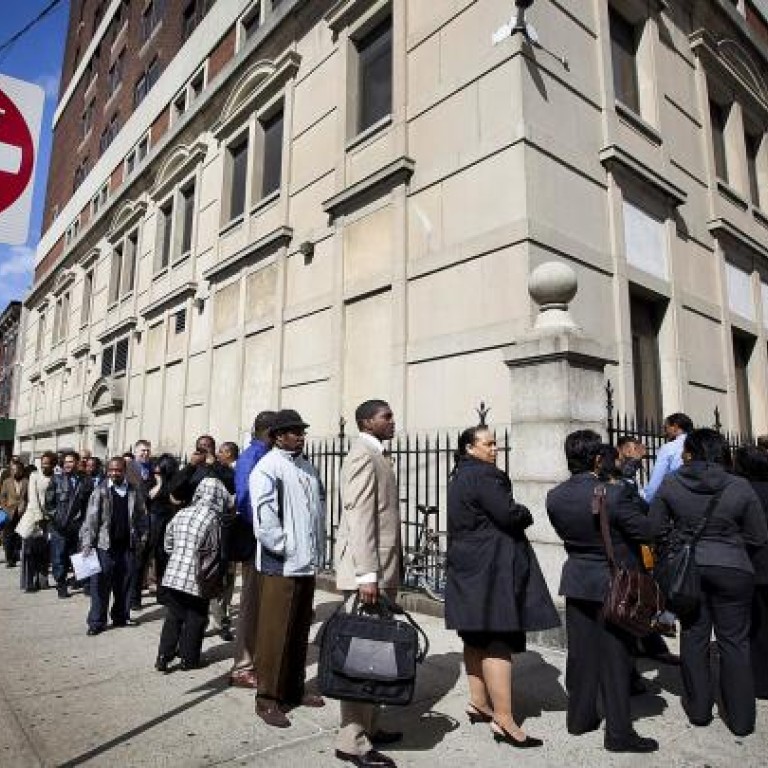
Unemployment isn't working
For all the talk of an economic rebound in the US, the jobless rate remains stubbornly high. It's time policymakers fix the broken American dream
America's wretched economic plight was revealed last week with the announcement that the country gained a mere 88,000 jobs last month. Although the monthly numbers can be unpredictable and erratic, it was less than half the figure that had been expected.

The answer is that the American dream is becoming unaffordable for too many people, and the question brings to mind the adage that if you have to ask the price of something, you cannot afford it.
As far as the March numbers are concerned, even the markets, which have been skittishly optimistic, shuddered. The March report was the first since automatic budget cuts began to take effect after the Obama administration and Republicans in Congress failed to reach a deal on the budget.
Pundits weighed in with their prognostications of doom and gloom. Mohamed El-Erian, the chief executive of Pimco, the world's largest bond fund, with almost US$2 trillion under management, described the report as "somewhat worrisome". Economist Brad DeLong wrote simply: "This is a bad employment report."
Beneath the headline figures, there were troubling indicators. The employment-to-adult-population ratio is 58.5 per cent, exactly where it was a year ago, and the labour force participation rate has fallen by 0.5 per cent in the past year, to its lowest level in more than three decades.
America's young are facing a tough struggle to find work. The official unemployment rate for Americans under 25 is 16.2 per cent - more than double the figure for the population as a whole.
But the official data understates the reality of the problem, because they only count people as unemployed if they are looking for work. Many people seem to be giving up.
The labour participation rate for young Americans has fallen dramatically, from 59.2 per cent in 2007 before the financial crisis to 54.5 per cent. If the people who have not bothered to look for jobs are included, the real unemployment rate among America's under 25s would be 22.9 per cent.
Critics have begun to ask hard questions about whether the policies of low interest rates and easy money are working. David Stockman, the White House budget director under former president Ronald Reagan, caused a stir last week by accusing Ben Bernanke, the chairman of the Federal Reserve, of running a "serial bubble machine".
Stockman said the benefits of the Fed's policy never escaped the canyons of Wall Street. Stock markets and asset prices rose to the benefit of the 1 per cent and the 0.1 per cent of America's super-rich.
Fed policy has indeed been compared to pushing on a string, with the obvious danger that it will only create a rise in asset valuations that will not be taken up in the creation of jobs.
Opportunities for job creation are beginning to suffer a double whammy from the political stand-off: the payroll tax increase is taking money out of consumers' pockets and making them more wary of spending even with what remains of their income, if they are working; the sequester is also having an impact by cutting federal spending, which eliminates jobs and erodes confidence.
The surprise may be only that stock markets have performed so well in the face of political deadlock and the prospect of damage to economic growth.
There should be real concern about the capture of the US economy by the super-rich. Louis Brandeis, a former Supreme Court justice, warned of this decades ago, saying: "We may have democracy, or we may have wealth concentrated in the hands of a few, but we can't have both."

Economist Jeffrey Sachs of Columbia University warned in his book, : "Corporate wealth translates into political power through campaign financing, corporate lobbying and the revolving door of jobs between government and industry; and political power translates into further wealth cuts through tax cuts, deregulation and sweetheart contracts between government and industry. Wealth begets power, and power begets wealth."
And American bosses have forgotten the wisdom of Henry Ford, who way back in 1915 decided that his workers would get US$5 a day, a good enough wage, he reckoned, to allow his workers to buy a Model T Ford and allow mass production of the car. A decent wage was a profitable investment all round.

